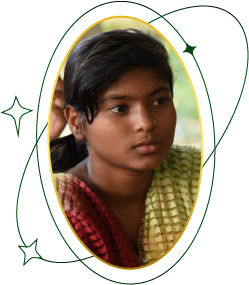



Sunita’s stand to change societal norms
In the remote, flood-prone village of Gadhghat, access to basic healthcare remains a significant challenge due to the absence of nearby primary health care centers. Deeply rooted social norms further worsen the situation especially for adolescent girls by discouraging them from adopting proper hygiene practices. Gender-based barriers restrict their decision-making power, and financial constraints only add to their health vulnerabilities.
Amidst these challenges, Sunita, an active member of CRY America’s Adolescent Girls’ Collective, emerged as a changemaker. Despite receiving little encouragement from her parents, she took it upon herself to motivate other girls in the community to adopt menstrual hygiene practices, emphasizing the importance of using sanitary napkins.
Recognizing her unwavering dedication to creating positive change, the project team made her the leader of the Adolescent Girls’ Collective and the operator of a local sanitary napkin bank. Gradually, as the impact of her work became visible and community girls began to shift their attitudes, even her initially hesitant parents were convinced. They began attending health sessions organized by the project and became vocal advocates for women’s health within the community.
When Sunita expressed her aspiration for higher education which was threatened by financial constraints, the project team stepped in once again. They connected her with a government financial aid program, ensuring that nothing would stand between her and her dreams.
*Image used for representation purpose only


The Problem
In the Champaran district, the existing healthcare facilities are in a compromised state due to poor infrastructure, shortage of qualified medical personnel, limited-service points, and recurrent floods in the district. The inaccessibility of health services leads many to opt for home deliveries instead of institutional ones. Additionally, early marriage and teenage pregnancies further deteriorate the health and well-being of women and children in the community.
The Solution
CRY America’s Project CHARDS has been working towards improved access to quality primary healthcare with the aim of reducing malnutrition, Maternal Mortality Rate (MMR), Child Mortality Rate (CMR), Infant Mortality Rate (IMR), and maternal and child morbidity. Key activities under this project include sensitizing women and adolescent girls on Antenatal (ANC) and Postnatal (PNC) care, managing menstrual hygiene, identifying Severely Underweight (SUW) and Moderately Underweight (MUW) children, and linking families to kitchen gardening practices to fight undernutrition.
Impact Of The Project


244
Institutional deliveries ensured


606
Children aged 9–12 months received full immunization
229
Pregnant women linked to maternity programs


20
MUW children moved to complete recovery


362
Collective members trained through Life Skills sessions
891
Lactating mothers practising exclusive breastfeeding


2025 Plans
- Conduct 120 sensitization sessions on institutional deliveries
- Sensitize 500 lactating mothers on the importance of nutrition and supplementary feeding
- Conduct 3 model Village Health, Sanitation, and Nutrition Days engaging 14 Adolescent Girls’ Collectives
- Sensitize the parents of 15 SUW children to avail of Nutritional Resource Centre (NRC) treatment
- Conduct follow-up check-ups on anemia screening for 150 adolescent girls
- Conduct Life Skills modules for 382 children from the Girls’ Collectives
- Conduct Life Skills modules engaging 158 parents on positive parenting
- Organize a climate change module with 160 collective members

















